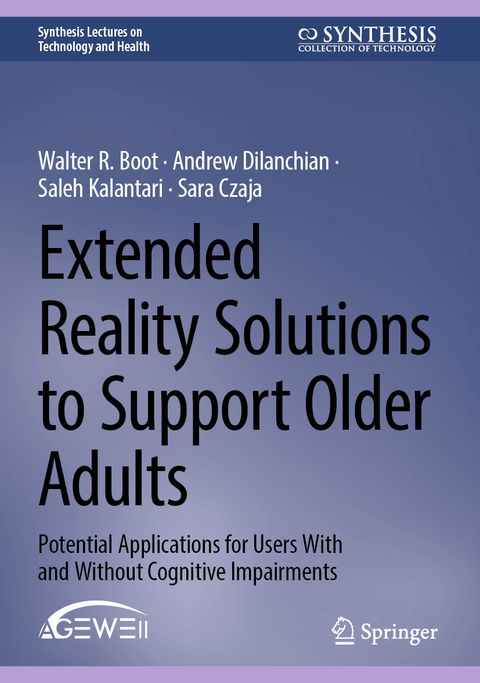
Extended Reality Solutions to Support Older Adults
Springer International Publishing (Verlag)
978-3-031-69219-2 (ISBN)
- Noch nicht erschienen - erscheint am 17.10.2024
- Versandkostenfrei innerhalb Deutschlands
- Auch auf Rechnung
- Verfügbarkeit in der Filiale vor Ort prüfen
- Artikel merken
This book explores one way in which recent hardware and software advances have placed humanity on the precipice of a significant shift in how technology can shape our interactions with the world around us: the application of transformative extended reality (XR) technology solutions to support the health, wellness, quality of life, and independence of older adults living with and without cognitive impairments. The book provides an overview of the state-of-the art research on XR-based solutions utilizing virtual reality (VR) and augmented reality (AR), challenges that can addressed with these technologies, evidence to date on the efficacy of these solutions, and the nature of these solutions and challenges to their implementation. It explores practical ways XR can be integrated into health and lifestyle maintenance activities for older populations in a diversity of situations through thematic chapters using realistic personas and scenarios. These thematic chapters are organized around the AGE-WELL Challenge Area topics, including staying connected, healthy lifestyles and wellness, mobility, and cognitive health, as well as an additional emphasis on leisure. Other chapters provide guidance on important issues to consider when designing XR-based solutions for older adults, how to evaluate and test XR solutions, the implementation of the user-centered design process, and the book concludes by highlighting unanswered questions and future research directions. This book approaches XR for older adults with and without cognitive impairments from the authors' diverse research backgrounds in psychology, engineering, gerontology, and design. It will be of interest to academic and industry professionals as well as care providers considering the potential for XR interventions now and in the future.
Walter R. Boot, Ph.D., is the Irving Sherwood Wright Professor in Geriatrics II within the Division of Geriatrics and Palliative Medicine, and Associate Director of the Center on Aging and Behavioral Research at Weill Cornell Medicine. He received his Ph.D. from the University of Illinois at Urbana-Champaign in Cognitive Psychology in 2007. Dr. Boot is one of five principal investigators of the multi-disciplinary Center for Research and Education on Aging and Technology Enhancement (CREATE), a long-standing and award-winning National Institute on Aging-funded center dedicated to ensuring that the benefits of technology can be realized by older adults. He is also Co-Director of the ENHANCE (Enhancing Neurocognitive Health, Abilities, Networks, & Community Engagement) Center, funded by the National Institute on Disability, Independent Living, and Rehabilitation Research, with a focus on how technology can support older adults living with cognitive impairments. His research interests include how existing and emerging technologies, including virtual reality and artificial intelligence, can support the health, wellbeing, quality of life, and social connectivity of older people. He is a Fellow of the American Psychological Association (APA) and the Gerontological Society of America.
Andrew Dilanchian, M.S., is a Psychology graduate student within the Cognition and Cognitive Neuroscience program at Florida State University. His research focuses on factors that contribute to successful immersive virtual reality (IVR) interactions across age groups. Additionally, he is interested in the potential of IVR to provide social and cognitive support, and cognitive health screening through gamified IVR-based cognitive tasks.
Saleh Kalantari, Ph.D., is an assistant professor in Cornell University's Department of Human Centered Design. He is the director of the Design and Augmented Intelligence Lab (DAIL) at Cornell, where his research group explores human-technology partnerships in the design process, creating opportunities for innovation and creativity. His work advances empirically grounded design, developing tools and techniques to improve understanding of design's impact-both virtual and built-on human behavior. Dr. Kalantari was awarded a National Science Foundation CAREER Award for his research agenda. His translational research has also earned recognition, including a Touchstone Gold Medal Award from the Center for Health Design and a nomination for the National Design Award by Cooper Hewitt. His work is supported by the NIH, NSF, and the Foundation for Health Environment Research.
Sara J. Czaja, Ph.D., is the Gladys and Roland Harriman Professor of Medicine and Director of the Center on Aging and Behavioral Research at Weill Cornell Medicine. She is also the Director of the multi-site Center for Research and Education on Aging and Technology Enhancement (CREATE), which focuses on the interface between older adults and technology systems. CREATE is funded by the National Institute on Aging. She is also the Co-Director of the ENHANCE (Enhancing Neurocognitive Health, Abilities, Networks, & Community Engagement) Center, funded by the National Institute on Disability, Independent Living, and Rehabilitation Research (NIDILRR), which focuses on technology support for older adults living with a cognitive impairment. She received B.S., M.S., and Ph.D. degrees from the University of Buffalo in New York and is an internationally recognized behavioral scientist with a background in human factors engineering, gerontology, and psychology. She was recruited to Weill Cornell Medicine from the University of Miami Miller School of Medicine where she was Director of the Center on Aging. She is a Fellow of the American Psychological Association (APA), the Human Factors and Ergonomics Society (HFES) and the Gerontolo
Chapter 1 Introduction.- Chapter 2 Challenge Overview.- Chapter 3 Staying Connected.
| Erscheint lt. Verlag | 18.10.2024 |
|---|---|
| Reihe/Serie | Synthesis Lectures on Technology and Health |
| Zusatzinfo | XX, 120 p. 20 illus. in color. |
| Verlagsort | Cham |
| Sprache | englisch |
| Maße | 168 x 240 mm |
| Themenwelt | Mathematik / Informatik ► Informatik ► Betriebssysteme / Server |
| Informatik ► Software Entwicklung ► User Interfaces (HCI) | |
| Schlagworte | AR • Assistive Technology • Digital Health • Mental Health • VR |
| ISBN-10 | 3-031-69219-5 / 3031692195 |
| ISBN-13 | 978-3-031-69219-2 / 9783031692192 |
| Zustand | Neuware |
| Haben Sie eine Frage zum Produkt? |
aus dem Bereich


